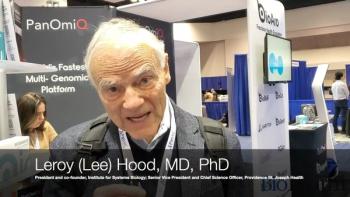
Eswar Iyer, MS, PhD, CEO and co-founder at Aikium Inc., describes a tool to overpower the data paucity problem in proteins.

Eswar Iyer, MS, PhD, CEO and co-founder at Aikium Inc., describes a tool to overpower the data paucity problem in proteins.

Under this early stage R&D collaboration, the companies aim to engineer recombinant biologics for blocking Fc receptors, which play a key role in autoimmune diseases.

Hood, a pioneer of systems biology and systems medicine, shared his personal interest in starting a new peptide-based, informational-driven pharmaceutical company that would address wellness and longevity during an interview with BioPharm Internaltion at the Precision Medicine World Conference.

Under this collaboration, GSK and Oxford will combine their complementary expertise in the immune system, vaccines, and cancer biology.

The approval makes Enhertu (fam-trastuzumab deruxtecan-nxki) the first HER2-directed therapy in the United States for treating HER2-low or HER2-ultralow metastatic breast cancer.

FDA has approved an additional indication for LEQEMBI (lecanemab-irmb) as a once-every-four-weeks maintenance therapy for early Alzheimer’s disease.

Bora said it will be involved in stages ranging from chemistry, manufacturing, and controls strategy through to clinical development.

The co-leaders of the financing were Novo Holdings and Bpifrance, with other investments from Invus, UI Investissement, Seroba Life Sciences, Fund+, Kurma Partners, Omnes Capital, and Turenne Capital.

CNP-104 is a biodegradable nanoparticle that previously received fast track designation from FDA in January 2022, which would eventually make it eligible for accelerated approval and priority review.

This latest fast track designation marks the second such designation by FDA for J&J’s tau-directed investigational therapies for treating Alzheimer’s disease.

The new company will harness splicing technology to innovate safer and more effective RNA therapies for severe genetic diseases.

The $94 million (€90 million) Series A funding will be used to support the development of the company’s pipeline of nCycles, oral macrocycle drugs that will be focused on validated biologic targets.

The approval makes HYQVIA [Immune Globulin Infusion 10% (human) with Recombinant Human Hyaluronidase] the first and only facilitated subcutaneous immunoglobulin to be approved in Japan to treat these disorders.

The companies will advance the development of Innovent’s ADC candidate, IBI3009, which has received IND approvals in the US, China, and Australia.

The approval of Hikma Pharmaceuticals’ liraglutide injection marks the first generic version of Victoza, a GLP-1 receptor agonist.

The results garnered from the Phase IIb study failed to achieve statistical significance in the primary endpoint.

Using Orexo’s powder-based drug delivery technology, the companies will develop mucosal vaccines in an inhaled formulation.

In the latest of a series of acquisitions this year, AbbVie will acquire Nimble Therapeutics, which includes that company’s lead asset, an oral peptide for treating psoriasis.

AbbVie has completed its $1.4 billion acquisition of Aliada Therapeutics, giving it access to Aliada’s disease-modifying therapy for Alzheimer’s disease.

Under the deals, the parties will advance therapeutics for fibrotic diseases, osteoarthritis, and Alzheimer’s disease.

The company will add a new laboratory facility at its Shanbally, Co. Cork, Ireland, manufacturing site.

Cellipont Bioservices and Xiogenix Partner on Advanced Filling Systems The companies will offer Cellipont’s clients access to Xiogenix’ fill/finish system for cell therapy production.

Under the deal, Novartis will in-license PTC518, an mRNA splice modulator for the huntingtin gene, which has the potential to be the first oral disease-modifying therapy for Huntington's disease.

Lilly will expand its recently acquired manufacturing facility in Wisconsin with a $3 billion investment, and Amgen will expand its North Carolina facility with a $1 billion investment.

GSK’s Biologics License Application for belantamab mafodotin (Blenrep) as part of a combination therapy has been accepted by the US regulatory body for review.

The agency will review the company’s supplemental new drug application for vutrisiran, a treatment for ATTR amyloidosis with cardiomyopathy.

With FDA's clearance, Kedrion can manufacture Ryplazim (plasminogen, human-tvmh), the first and only FDA-approved therapy for treating PLGD-1, at its Bolognana, Italy, site.

The investment will allow Sanofi to strengthen antibody bioproduction at its Lyon Gerland site in France.

Eisai Europe and Biogen have received a positive opinion for the monoclonal antibody therapy to be used as a treatment of adult patients with early Alzheimer’s disease.

Under an agreement, Leads Biolabs has granted the new company, Oblenio Bio, an exclusive option to license LBL-051, a tri-specific T-cell engager antibody.